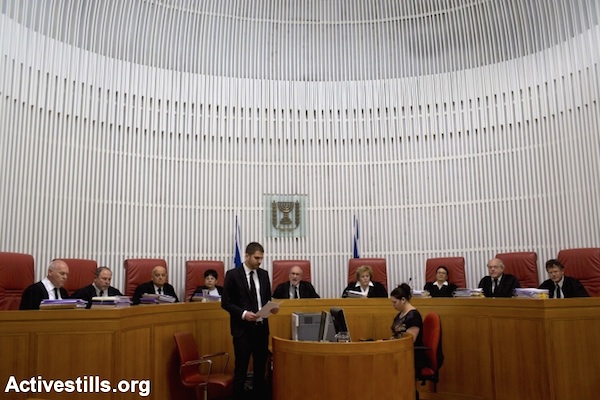The High Court decision on the ‘boycott law’ uses the word terror 11 times, likens BDS supporters to Holocaust deniers and quotes a right-wing columnist who makes it his duty to target boycott supporters.
By Yael Marom

The justices of Israel’s High Court upheld the controversial “boycott law” Wednesday, giving ground for individuals to sue anyone who calls for a boycott of Israel, or areas under its control (read: the occupied territories).
But beyond the consequences, questions and political issues that arise from the ruling, there are also a few gems that would be a shame to miss. The word “terror” is mentioned 11 times in the entire verdict. Justice Rubenstein says the word “Holocaust” three times, while the High Court makes two references to the book “Industry of Lies,” by conservative Yedioth Ahronoth columnist Ben-Dror Yemini (known for his articles against the boycott movement, and for attacking leftists for positions they often do not hold). Because the decision is 233 pages long, I decided to pick out the best parts for the readers.
Terrorists
“Thus the call for boycott falls into the category that is known in constitutional literature: the democratic paradox, which allows for limiting the rights of those who seek to enjoy the fruits of democracy in order to harm it. Calling for boycott and participating in it, therefore, can sometimes be considered ‘political terror.'”
(Justice Meltzer, pg. 37)
Holocaust deniers
“Even the boycott against Israel, in its old form, which Israel — as well as other countries, headed by the United States — worked to combat, falls within the realm of freedom of speech; it would be terrible for this freedom of speech to reach its goals. It may be akin to — without comparing — Holocaust denial and anti-Semitic and racist remarks, which in my eyes must enjoy the protection of free speech.”
(Justice Rubinstein, pg. 164)
Pharaohs
“These lines are written on the eve of Passover. In the Passover Hagadah, we read about the same promise made from above to ensure the survival of the Jewish people, despite its enemies — ‘And this is what kept our fathers and what keeps us surviving. For, not only one arose and tried to destroy us, rather in every generation they try to destroy us, and God saves us from their hands.’ There is no problem with the fact that the Knesset passes a law in the struggle against those who try to destroy us.”(Justice Rubinstein, pg. 178)
Racist liars
‘There are those who offer a different name for the BDS movement: Bigoted Dishonest Shameful’
(Justice Amit, pg. 180)
Big Brother
“…There is something Orwellian in the petitioners’ claim that the law restricts freedom of speech. Academic-cultural boycotts constitute silencing in the simplest sense of the word, a monopoly over the entire marketplace of ideas, a clear antithesis to freedom of speech and the idea of a free market of ideas. The cultural-academic boycott of Israel is intended to paralyze and silence political expression, to make one opinion and one ‘truth.'”
(Justice Amit, pg. 189)
Yael Marom is Just Vision’s public engagement manager in Israel and a co-editor of Local Call, where this article was originally published in Hebrew.

